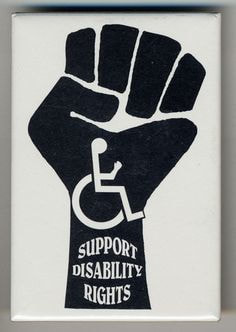
Disabled communities comprised specifically of disabled people are distinct from the larger disability community which typically includes caregivers, family members, advocates, and other people who consider themselves allies. By gathering for conversation with one another, disabled people are able to define our lives and our experiences in our own terms, push back against ableism in society, organize advocacy efforts, and support each other. This discourse is critical to the continuation of disability culture, and it is critical that spaces exist for disabled people to communicate in community without simultaneously fighting against ableist attempts to define our bodies, lives, experiences, and worth.
Last spring I attended the New York City One-Day Stuttering Conference. It was an incredible experience--having an entire day to be in community and conversation in a space explicitly for stutterers. Having insulation from fluent society for the day provided safety to engage in conversation in a different manner than I have felt comfortable in groups attended by fluent SLPs and others. Through presentations, breakout sessions, and informal conversation, I had many interesting and substantive discussions with other stutterers about the stuttering community itself - about challenges we face, ways we can change, and areas for future work.
Leaving the conference, I have many questions I’d like to pose to stutterers as a disabled community: how can we align our community with larger disability justice work? What perspectives and experiences are underrepresented in our narratives? How can our communities address ableism with an increased awareness of intersectionality? What spaces exist in person or virtually to continue these conversations in community?
It is a luxury to be able to ask a question about disability and know that any answer will come from a disabled person. If I were to ask any of these questions in a mixed dysfluent/fluent support group, or on Twitter, among the answers I’d receive a flood of unsolicited advice from fluent people, pity from those observing my experience from afar, and the opinions of people who consider themselves experts on my voice.
This is the gift of community--space away from distraction. When fighting against stereotypes, the force of ableism to misrepresent our lives, and a society which undervalues our perspectives, it is impossible to construct a venue for conversation where we can be vulnerable enough to reflect on our work and the manner in which we relate to each other. It is impossible to acknowledge the ways we have contributed to our community and account for the ways we have hurt it. It is impossible to imagine the ways we can better support one another when we are simultaneously fighting for survival.
-Erin
[1] Originated by Tyler at http://crpl-pnk.tumblr.com
[2] Originated by Alice Wong at https://twitter.com/DisVisibility
[3] Originated by Vilissa Thompson at https://twitter.com/VilissaThompson
[4] Originated by Ki’tay Davidson at https://twitter.com/KitayDavidson
[5] https://twitter.com/NationalADAPT
 RSS Feed
RSS Feed
